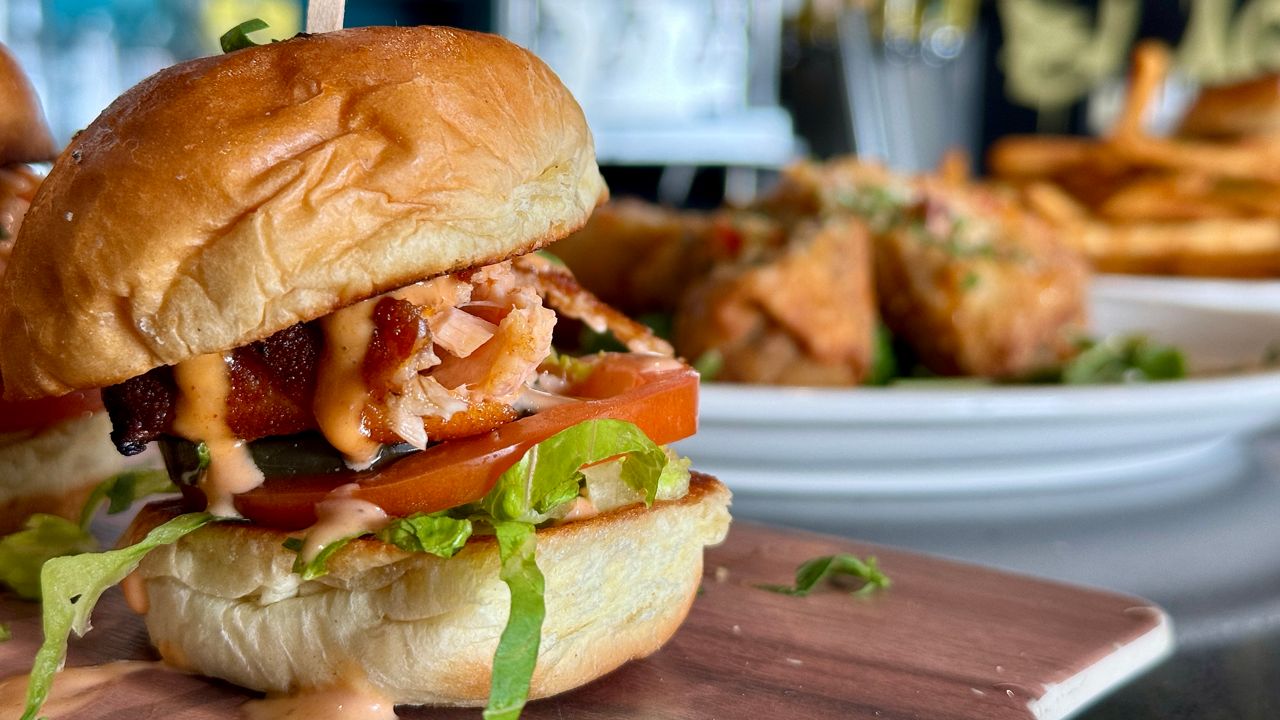NORTH HOLLYWOOD, Calif. — Los Angeles is known for its diverse food scene.
Now in its seventh year, LA is spotlighting Black-owned restaurants and celebrating culture, community, and, of course, food from across the city.
For chef Anthony Mingo, the kitchen at BlaqHaus in North Hollywood is more than just a place to cook; it's where memories come to life.
"I've been cooking for about 15 years. It's one of my passions that I love to do. I was raised in Virginia, my mother taught me how to cook" Mingo says.
But it wasn't just his mother — his household was filled with cooking women.
"I grew up with four sisters, so we did a lot of cooking at home. Grandmothers, aunties, so soul food has been in our family for generations and we just love to cook it," he added.
That heritage comes out in dishes like BlaqHaus' top-selling 'Soul Roll.'
"It does consist of a slow-cooked, five-hour short rib roast, our collard greens, and also our mac and cheese. If you've been to BlaqHaus, you know, our mac and cheese is famous. So it is all wrapped up in a roll, deep fried, garnished with a sweet Thai chili sauce, parsley and Parmesan," Mingo said. "People love it."
But his love for cooking isn't just about the food — it's about serving the community. "I love cooking for our community and our people," he says proudly.
BlaqHaus' owner, TC, shares that vision, especially after she noticed a gap in the local dining scene.
"When I moved to the North Hollywood community, there was just no presence of African-American community with food, just, you know, vibes, music, you know, space and presence," she said. "After two years of complaining about how far I had to drive to find those things, I decided to open a place of my own."
TC had no prior experience in the restaurant industry, but with 13 years of corporate experience, she decided to go for it.
"There's been a ton of talent that have come through this building that've helped create menus, create drink menus and bring Southern food to the North Hollywood community. "
But running a restaurant comes with its challenges.
"I think that the cost to get into this business — to get into a brick and mortar location and some of the requirements — are just almost what would consider to be almost impossible, especially when you're dealing with liquor and trying to get a liquor license and the cost associated with it."
TC believes the financial burden is one of the reasons there aren't more Black-owned restaurants.
"I think as a minority, it's even more difficult because we don't typically have some of that traditional, what I would call generational wealth that's being passed on to make investments in businesses like these," TC explains.
A 2024 report from Goldman Sachs supports TC's experience, showing that Black small business owners face significant barriers in accessing capital, are less likely to secure loans, and often deal with predatory payment terms at higher rates.
Falayn Ferrell, managing partner of Black Restaurant Week, knows how critical it is to support Black businesses.
"When you really look at small businesses, for them to pay for the cost of PR, radio, social media, that could add up a lot for some of the mom-and-pop restaurants," she said.
Black Restaurant Week was started in Houston, Texas, in 2016 to help alleviate some of the pain points.
Ferrell says a lot of Black-owned restaurants struggled to access other food festivals and restaurant weeks.
"Typically because they didn't have the structure for it," Ferrell said. "They're your fast-casual, soul food spots, barbecue joints — they didn't fit that two-course, three-course fine dining model, so we wanted to provide something that was a little bit more all-inclusive for all the restaurants, the food trucks, the bakeries."
The event helps small businesses by providing marketing support that they might not be able to afford on their own.
The organization also has a foundation called Feed the Soul Foundation that picks up where Black Restaurant Week leaves off, offering business development and grants.
For TC, the support from Black Restaurant Week has been invaluable.
"I think the community definitely supports it," she said. "I think that the community wants to see more Black food. They want to see more African-American cuisine. They want to see more Southern stuff and creativity and elevated food," she added.
Black Restaurant Week Los Angeles runs through Sunday. You can find out more about the restaurants and other cities on blackrestaurantweeks.com.



